AUG 12, 2025. Invited Lecture at Pohang Naval Air Command
Hello. Today, Sunim was invited by the Pohang Naval Air Command to give a Dharma Q&A for military personnel and their families.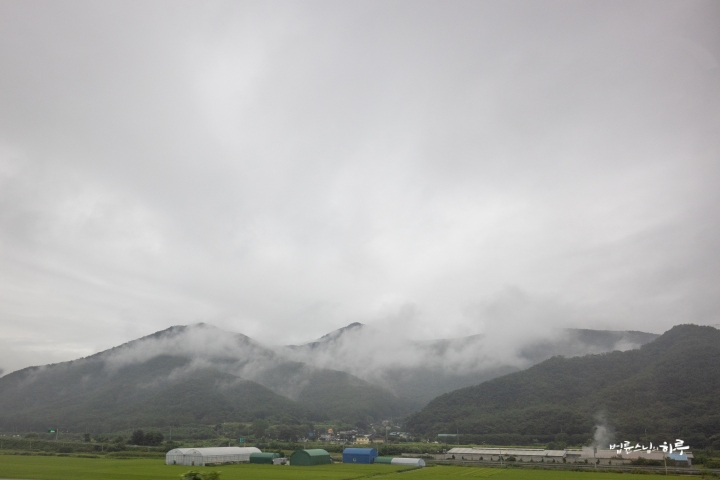
After completing morning practice and meditation, Sunim headed to Pohang at 8 AM. When Sunim gave an invited lecture at the Navy Headquarters on July 22nd, the Chief of Naval Operations requested that Sunim provide comfort to the Pohang Naval Air Command, which was experiencing significant emotional difficulties due to a maritime patrol aircraft crash. Sunim readily agreed to make time for the lecture.

After an hour’s drive, Sunim arrived at the Pohang Naval Air Command at 9:20 AM. As Sunim stepped out of the car, Commander Cho Young-sang and other military officials warmly welcomed him.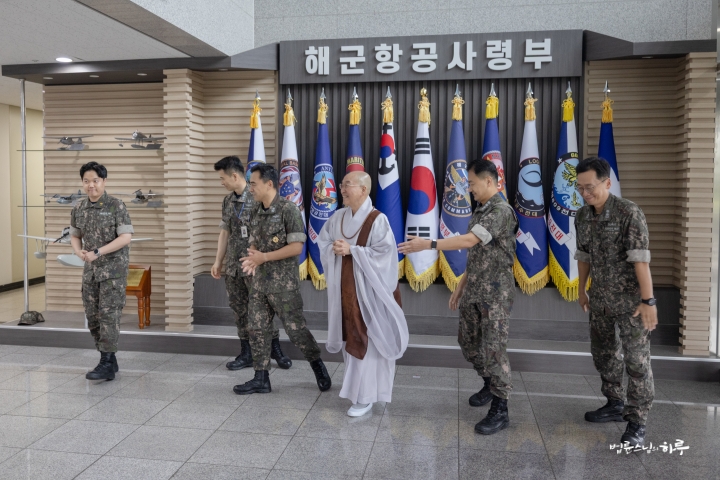
After taking a commemorative photo at the command entrance, they moved to the reception room for tea. First, the Commander introduced the Air Command.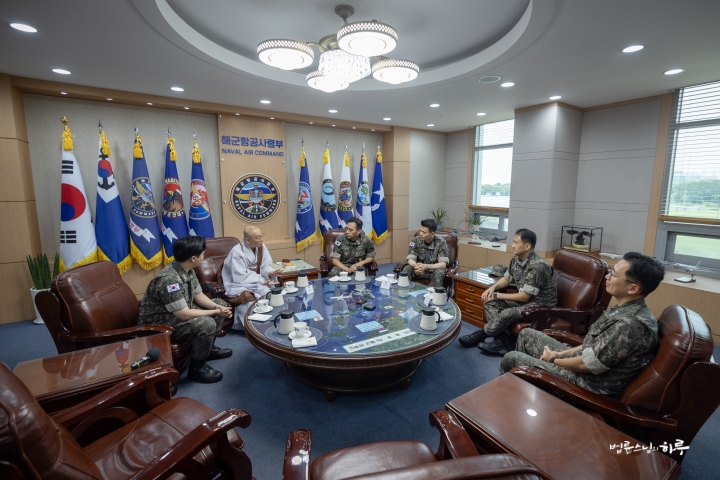
“We oversee all of South Korea’s maritime areas using aircraft. Though we are a small unit, we fly the farthest to carry out operations. We are responsible for an area eight times the size of the Korean Peninsula.”
The military officials then asked Sunim questions about their curiosities.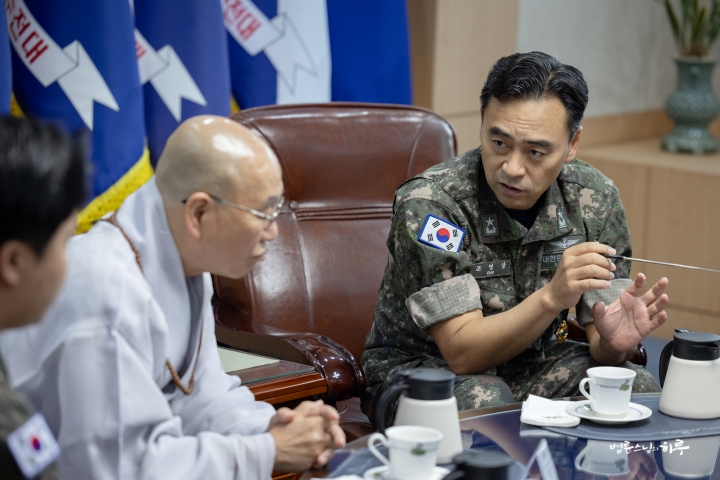
“We heard you became a monk in Gyeongju, which is close to Pohang. It seems you became a monk at a young age.”
“My teacher had me become a monk when I was attending Gyeongju High School. As a high school student with a shaved head, I wore a school uniform to school and Buddhist robes at the temple. Since high school students and monks had the same hairstyle, there was no problem.” (laughter) 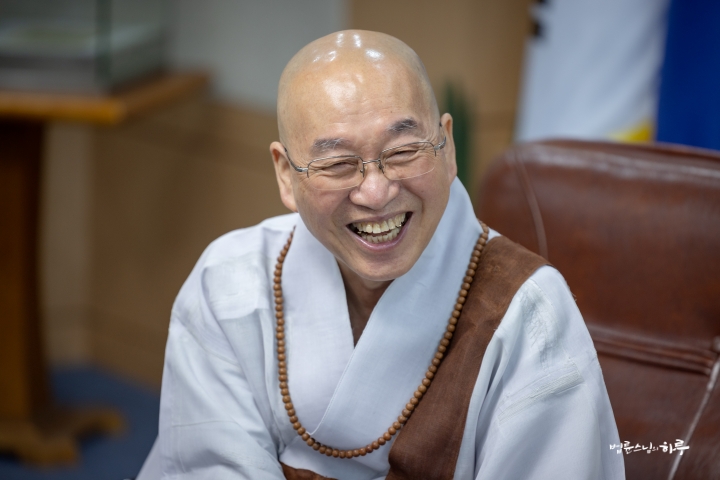
At that time, many Theravada monks came to Korea for the World Buddhist Conference. Since there was a feeling that Korean Buddhism wasn’t quite up to par, my teacher made a suggestion. When the monks were coming from Bulguksa Temple to Bunhwangsa Temple, he had 100 students wear Buddhist robes and bow in the streets to greet them. The Theravada monks were incredibly moved. Since high school students already had shaved heads, we only needed to prepare the robes. It happened to be autumn, so we picked a whole basket of cosmos flowers and scattered the petals too.” (laughter) 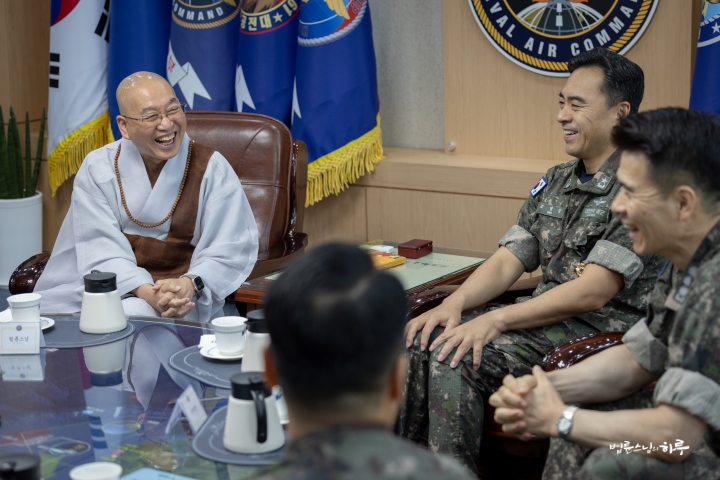
As they chatted and laughed, it was time to begin the lecture. After expressing gratitude for the Naval Air Command’s efforts and dedication to national defense, Sunim rose from his seat.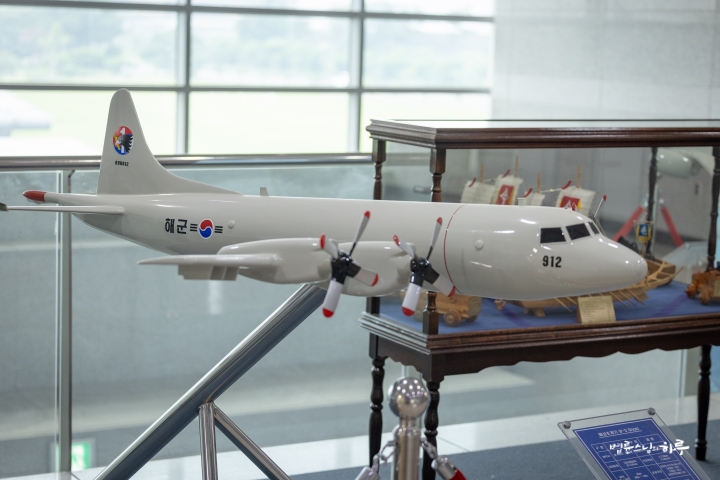
They all headed to the Aviation Management Building together. With about 500 military personnel and their families filling the venue, thunderous applause and cheers erupted as Sunim appeared.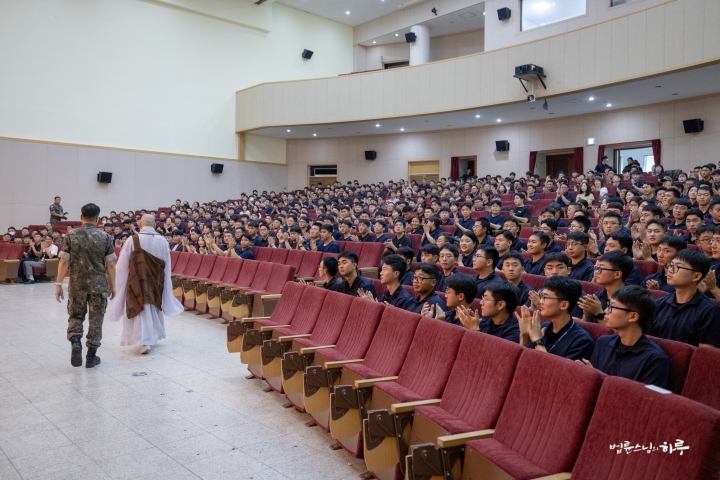
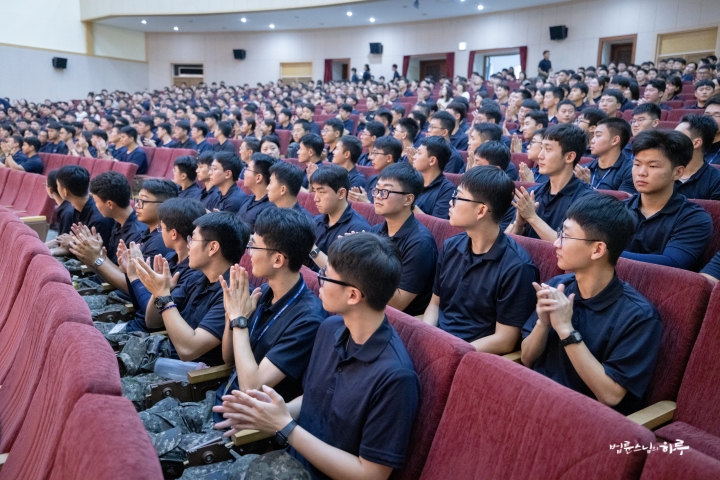
After the host introduced Sunim, he took the stage and began the lecture. Sunim first suggested taking a moment to honor the soldiers who died in the naval patrol aircraft crash that occurred in Donghae-myeon, Pohang on May 29th.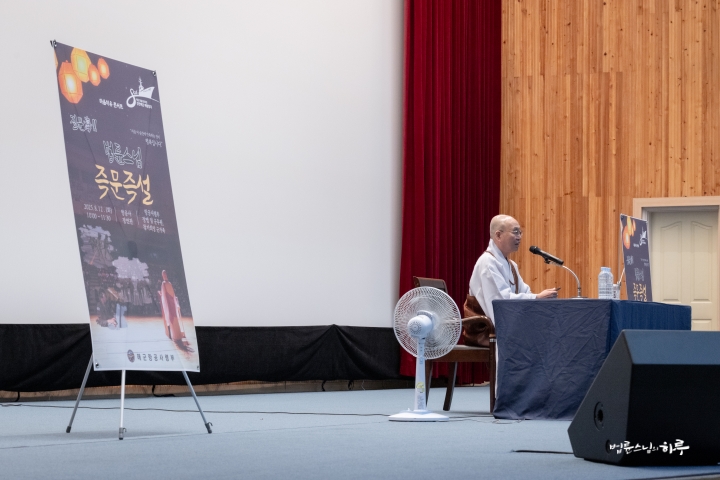
“Before the lecture, let’s have a moment of silence to pray for the souls of the four service members who were sacrificed in the unfortunate accident during flight on May 29th.” 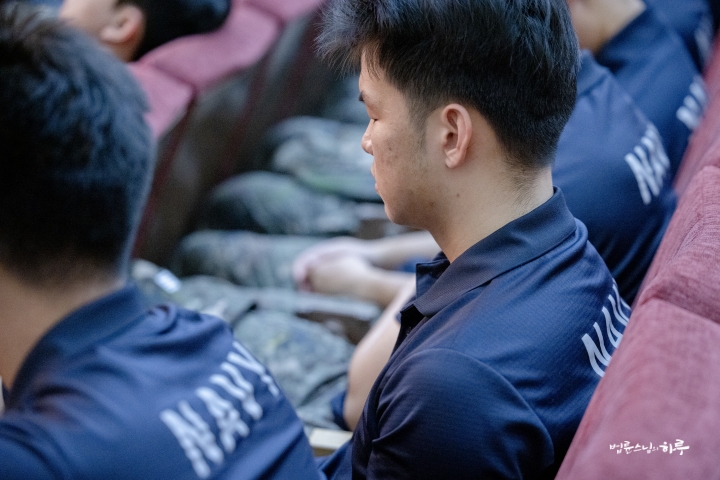
After a brief moment of silence, they began their conversation.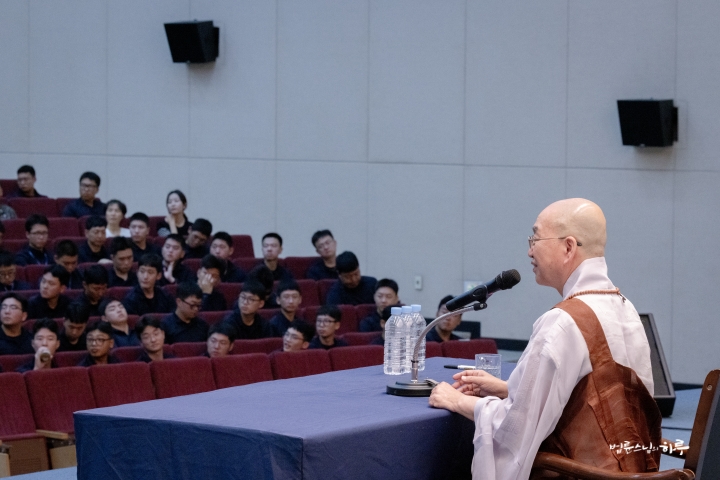
“Last month, I visited the Navy Headquarters at Gyeryongdae. The audience consisted mainly of officers, and although it was hosted by the Navy, the Air Force and Army also attended. Following the maritime patrol aircraft crash at the Pohang Naval Aviation Command, I was asked to visit and offer comfort to the people there, and I gladly accepted the invitation to come here today.
In life, unwanted events sometimes occur unexpectedly. We often consider unwanted events as misfortune and think we are happy when things go as we wish. However, this world doesn’t always work according to our desires. Sometimes what we want comes to pass, and sometimes it doesn’t. Moreover, achieving what we want doesn’t always lead to positive outcomes. Sometimes, getting what we wished for can actually bring trouble. 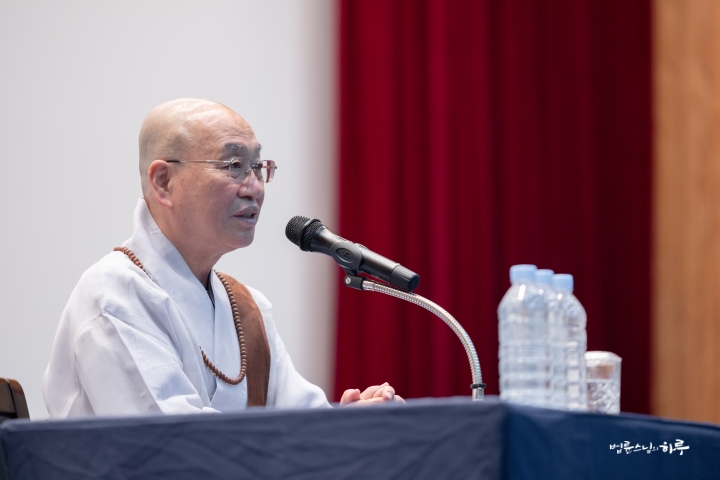
When we understand this principle of life, we develop an attitude of doing our best toward any goal we set, being grateful if it’s achieved, and trying again if it’s not. If it still doesn’t work out, we can either give up or challenge ourselves once more. When we try again, we can study the causes of our previous failure and turn it into an opportunity for growth. This is why people say, ‘Failure is the mother of success.’
When we attempt something and fail, feeling frustrated or despairing isn’t due to the failure itself but to our greed. For example, let’s say when learning to ride a bicycle for the first time, you need to fall about ten times before you can finally ride it. If you see someone who already rides well and think after falling three times, ‘Maybe bicycles don’t suit me,’ ‘Is there something wrong with this bicycle?’ or ‘Why is it only me who can’t do it?’ this is because of the greed to quickly obtain results while ignoring the process. Falling while learning to ride a bicycle isn’t a problem in itself. Knowing that such a process is necessary when learning something new, we willingly accept failure and maintain an attitude of getting back up and trying again even after falling. 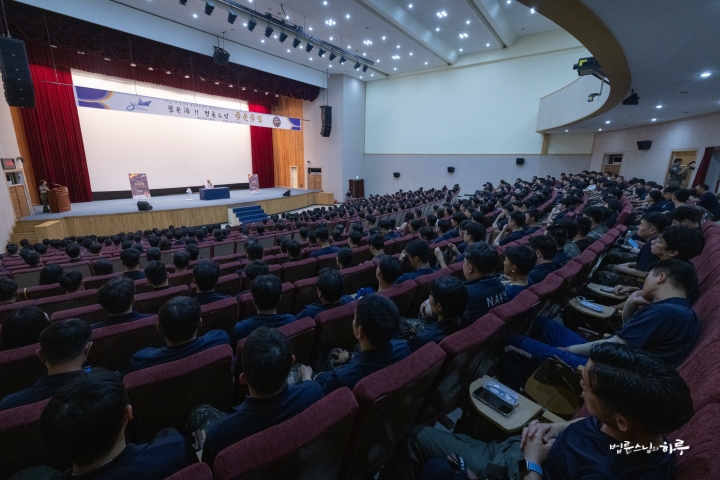
Growth Through Failure, the Path to Safety Left by Sacrifice
While this incident is unfortunate, it can serve as an opportunity to establish policies that minimize defects by maintaining aircraft more safely and replacing aging models with newer ones. Training can also be planned more meticulously. If an accident can prevent larger accidents that might occur in the future, then the previous failure is not merely unfortunate. If it has the effect of preventing the sacrifice of many remaining people, then the sacrifice of those who have departed will not be in vain and will become a great merit. I hope you will view this incident from that perspective.
Today’s gathering is a place where you can temporarily set aside your identity as soldiers and freely share various difficulties and problems you face in daily life as individuals, as well as things you want to say or good suggestions. Many officers have attended, but even if the commander is present, feel free to speak up if you have complaints. Today is a time for dialogue, and if anyone takes issue with that, I will take responsibility.” (laughter) 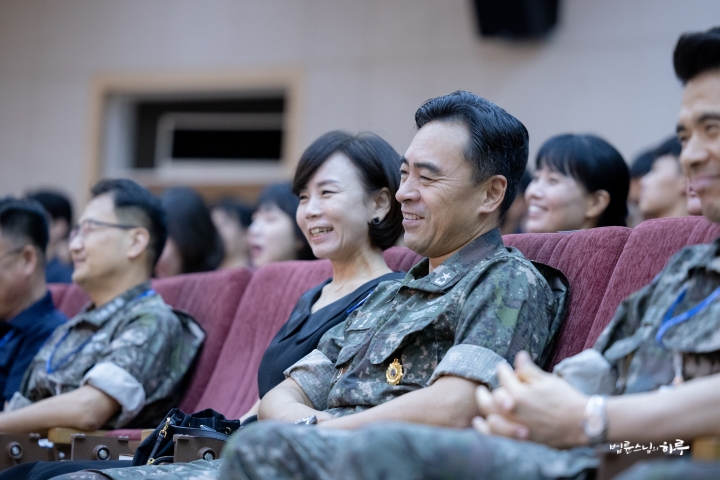
Following this, anyone could raise their hand and ask questions about concerns they face in life. Many service members raised their hands wanting to ask questions. Over the course of two hours, 14 military personnel asked Sunim questions and engaged in dialogue.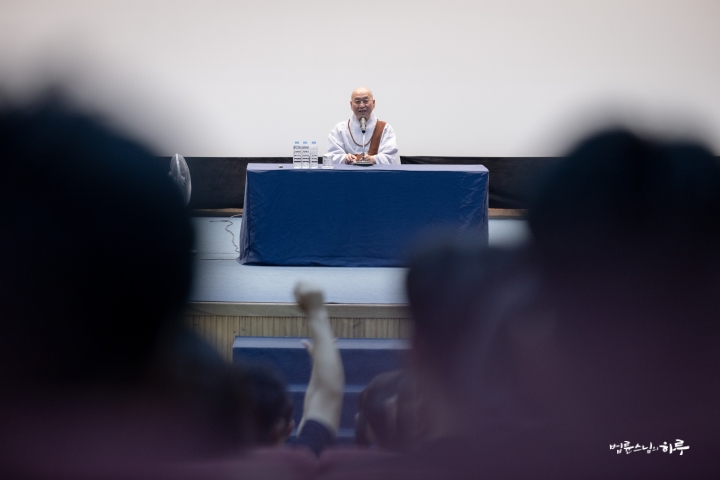
One of them had been living as a weekend couple for 10 years and often neglected his family due to fatigue when he went home. He sought Sunim’s advice on how to promote family harmony.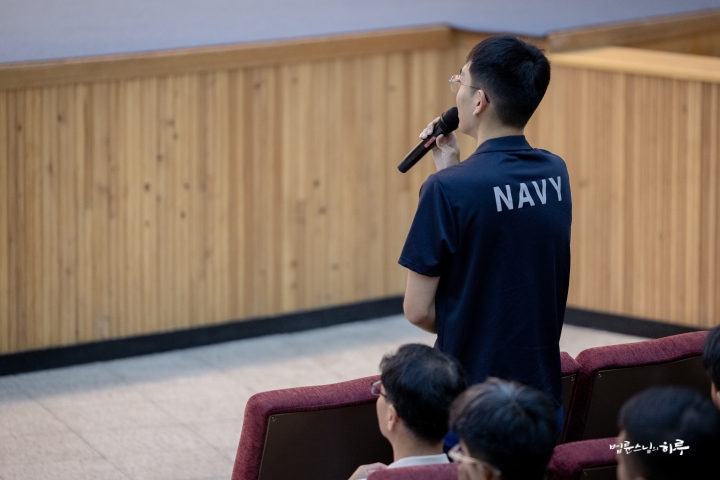
My Wife Is Exhausted from Solo Parenting, My Child Has Become Distant… What Should I Do?
“While you think this problem arose because you’re a weekend couple, couples who live together experience similar problems. Living together constantly brings daily conflicts, while living apart creates feelings of disappointment and dissatisfaction from the separation. So if you live apart, you need to observe and respond to the problems that arise from living apart, and if you live together, you need to observe and resolve the problems that arise from living together. 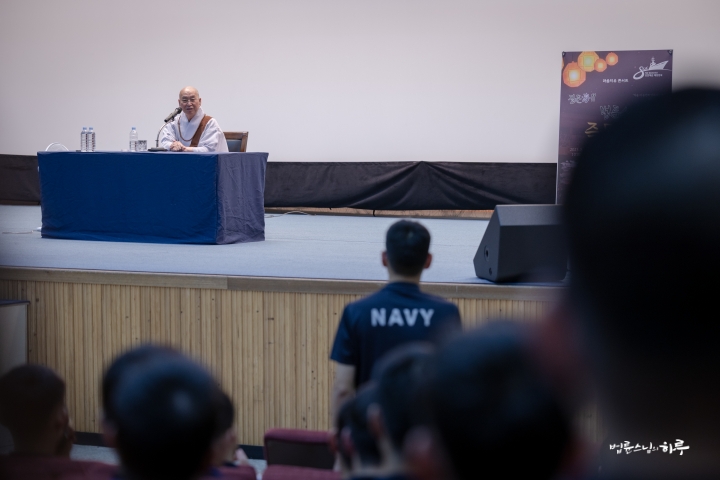
For example, when a married couple with children both work outside the home, the wife inevitably struggles to balance work and childcare. She may feel that her husband isn’t putting in as much effort as she is. Since both are working, they need to find balance. If the wife takes care of the children, the husband should cook or clean. However, traditionally, childcare, cooking, and cleaning have been deeply ingrained as women’s responsibilities, while men have been expected to handle only the heavier, more significant tasks. For thousands of years, farming was considered men’s work, while housekeeping and childcare were women’s responsibility. Today, however, family roles and lifestyles have changed significantly. It’s time to break free from these frameworks and divide responsibilities according to the situation.
This doesn’t mean the husband should directly care for the baby. Since babies need their mothers, husbands should take over other tasks their wives usually handle. A husband should be able to say, ‘Honey, you take care of the baby. I’ll cook.’ However, problems arise when husbands say “I’ll watch the baby” but only do a half-hearted job, leading to complaints from their wives about not doing it properly. It’s better to create balance by making childcare the wife’s primary responsibility while the husband focuses on cooking, cleaning, and grocery shopping. 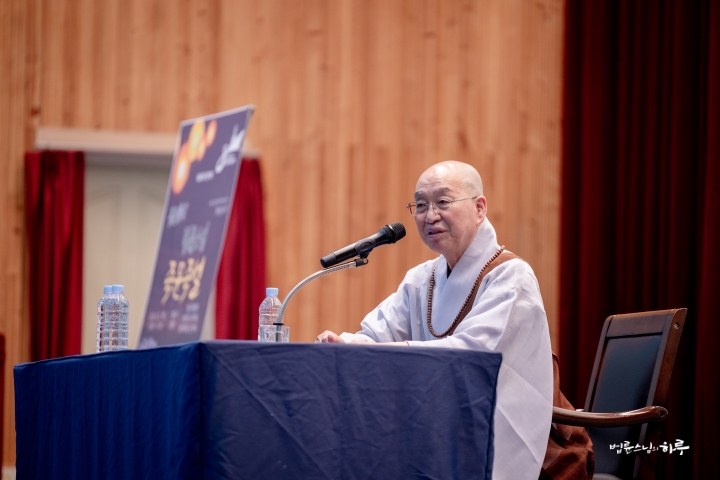
When couples live apart during the week, there tend to be fewer complaints about the husband not helping with childcare during weekdays. This is because it’s taken for granted that the wife handles all the cooking, cleaning, and childcare on her own. In such cases, when the husband comes home on weekends, he should say, ‘You’ve worked so hard. It must have been tough being alone,’ and then play with the children, cook meals, do the dishes, and give his wife a chance to rest. However, if he thinks, ‘I’m tired too. I’ve worked for five days and want to rest on the weekend, but she keeps asking me to do things,’ married life becomes difficult. If that’s the case, he should live alone like me.
Even traditional families in the past weren’t without conflict. While husbands went to work all week and wanted to stay home on weekends, wives who had been home for five days wanted to go out on weekends. Conflict arose even from seeing the husband sitting on the sofa watching TV. So even if you’re not a weekend couple, you shouldn’t think of the two days at home as a vacation. You need the mindset that you’re playing two roles: a soldier for five weekdays and a husband for two weekend days. On weekends, you should play with the children, cook, do laundry, clean, fix things around the house if needed, and then return to the military on Monday to work again. Even if you feel exhausted from work, you need to maintain this attitude to keep your family together. 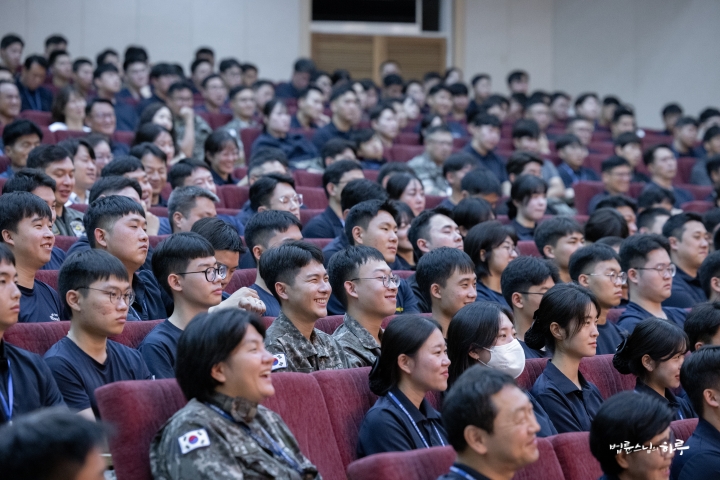
As a wife, if she has to take care of the children for five days straight and then also take care of her husband on weekends, she’ll become exhausted with married life. She’ll feel disillusioned, thinking ‘Why do I have to live like this?’ and start complaining. At times like these, it’s necessary to comfort her with even just a simple ‘Thank you for your hard work.’ But if the response is ‘I come home after a week and all you do is nag,’ it becomes difficult to live together.
I don’t have confidence to do that either, which is why I live alone like this. To fulfill both roles, I’d probably have to stay up all night. You need to have this perspective to maintain a family. Until the children grow up, remember that weekends aren’t for rest but for juggling two jobs. If you go home with this attitude, the problems will be somewhat overcome.”
“Thank you. I understand well.”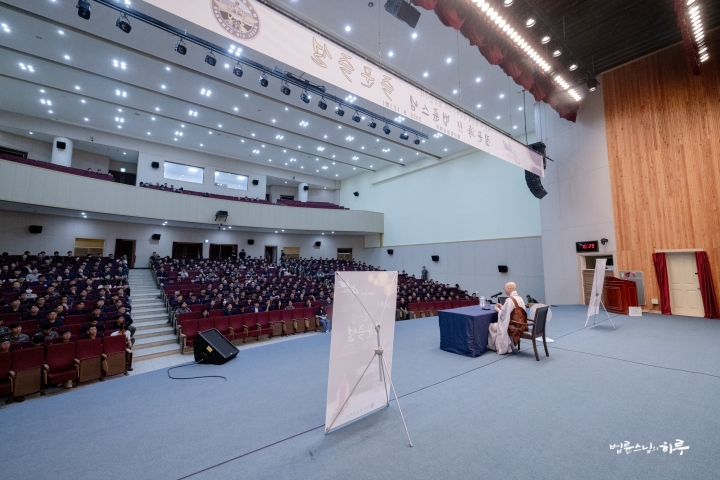
Questions continued to follow.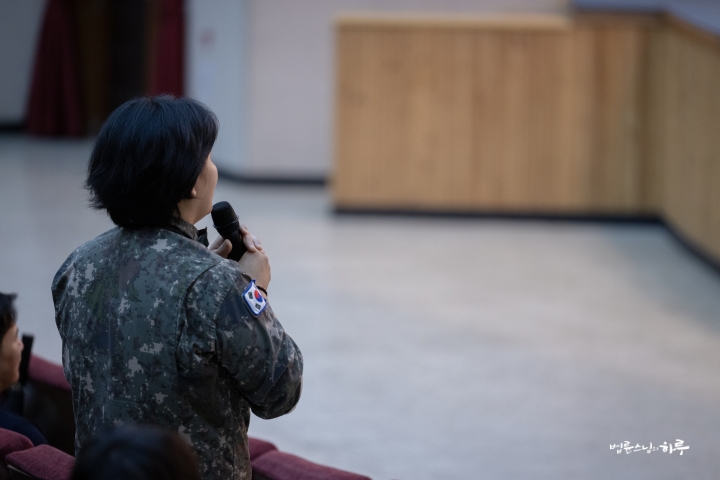
Why do monks wear gray clothes?
Do you ever get angry, Sunim? How do you control your mind when that happens?
My husband wanted to take care of his mother, so we’re living together. Living with in-laws is difficult.
Are there heating and cooling systems in the spaces where monks practice? How do monks feel about people who come for temple stays?
As a soldier living far from home, how can I show filial piety to my parents from a distance?
What do you think about DJ Monk New-Jean who sings and dances?
I’ve been preparing for employment for five years and have failed countless times, so I’m afraid to try again. What mindset should I have?
To do what I want to do, I need my parents’ support. Their expectations are burdensome.
I often end up counseling people about their worries. Do you have any know-how for counseling?
Even when something uncomfortable happens, I try to understand it thinking ‘It could happen,’ but when the same situation repeats, I get angry. Is it because my practice is insufficient?
My wife and daughter keep fighting. Should I intervene as the person in the middle?
Do you ever feel hatred, Sunim? What do you do when that happens?
Among the various questions, many were about the difficulties felt as soldiers. One officer asked for Sunim’s advice on what perspective to have, saying that sometimes when carrying out duties, getting angry makes subordinates more careful and can lead to better results.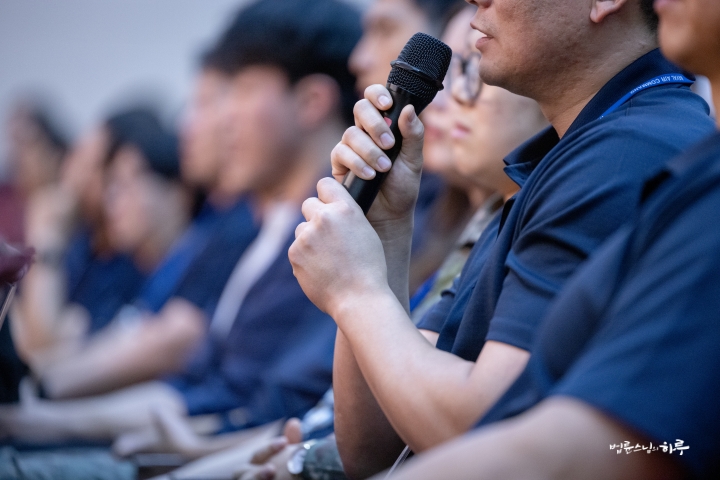
Isn’t Getting Angry Sometimes Necessary to Carry Out Military Duties?
“When we talk about any work in the world, first, it must be effective, and second, it must produce some level of results. This applies not only to the military but also to companies. Let’s say you were given a mission and worked with subordinates, but the results fell short of expectations. Will getting angry improve the results next time? That’s not the case. The reason I’m getting angry isn’t because of the work. It’s just because I have a bad temper. Getting angry because work wasn’t done well is just a way of rationalizing my emotions.. We shouldn’t connect work with emotions. 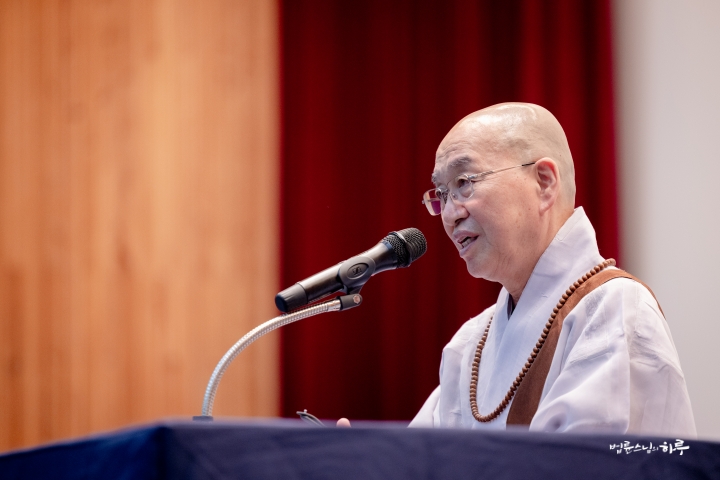
However, if pretending to be angry made people more careful and improved results, then it could be a means to an end. In such cases, you should just pretend without feeling stressed. But if pretending to be angry hurts subordinates’ feelings and harms the organization in the long term, then even if there are immediate results, it can’t be called an efficient method. In that case, you should change your approach.
Getting angry because work didn’t go well doesn’t help at all. It’s just an emotional issue. Getting angry doesn’t make impossible things possible. When water is spilled, getting angry doesn’t put the spilled water back. That’s why I think getting angry is a waste of emotion. However, if pretending to be angry to prevent spilling water next time makes people more careful, it could be an efficient method. But when you get angry, you shouldn’t feel stressed. So when you get angry, you need to examine yourself to see if you’re really angry or just pretending for efficiency. If you’re truly angry, you should view it as an emotional issue unrelated to work. 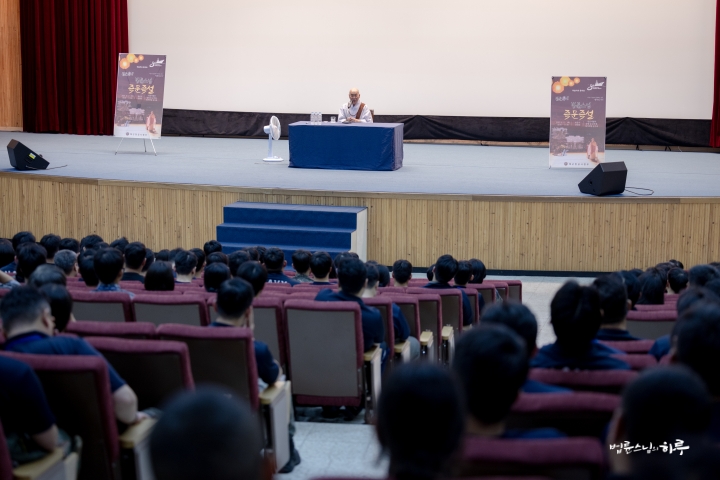
So practice doesn’t hinder the completion of any mission, rather, it helps find much more effective methods. Instead of getting excited and angry when receiving results reports, you should move toward researching ‘Why didn’t it work?’ and making improvements. Finding out whether there’s insufficient training or if the method is wrong and then practicing again. That’s the perspective of practice.”
“Yes, thank you. I understand well.”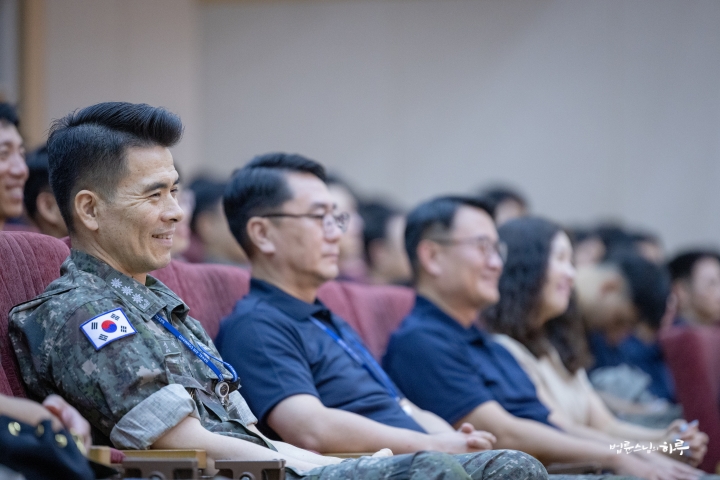
As they conversed, time flew by and it was time to wrap up. Although many service members wanted to ask more questions, Sunim concluded with closing remarks, leaving their eagerness behind.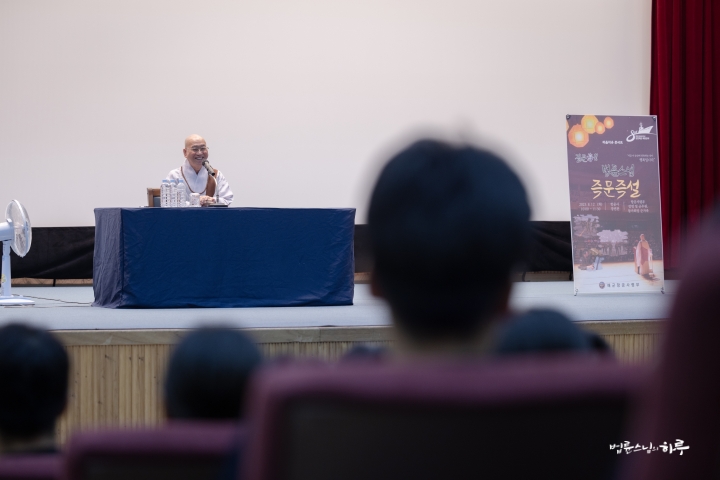
“I don’t know how helpful today’s Dharma Q&A was for you, but it helps me a lot. I learn things like ‘Oh, people with children have these kinds of concerns,’ ‘Married people have those kinds of worries,’ ‘Service members think about these issues.’ It greatly helps me understand various situations in the world. So our conversation isn’t one-sided giving. It’s mutually beneficial. That’s why I don’t accept speaker fees. Since I also learn from listening to your stories, I come with the mindset of friends gathering to talk. However, since my time is limited, I tend to prioritize allocating lecture time to those in public institutions like the military, police, and civil servants. I simply can’t go to lectures requested by private companies due to time constraints. There’s no other meaning behind it. 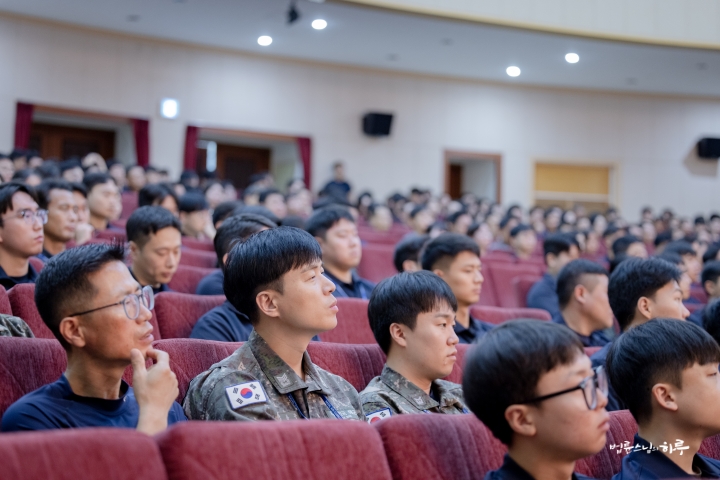
I think some of you might not have liked what I said today or might feel upset. Everyone has different perspectives, and we live in such a world. Thinking this way might make you feel more at ease. I’m grateful to all of you who work hard to protect the lives of citizens and the nation’s property despite difficult conditions, and I hope you’ll continue to do your duties well while living with peace of mind.”
Sunim’s warm encouragement provided great comfort to the service members. The lecture ended with loud applause.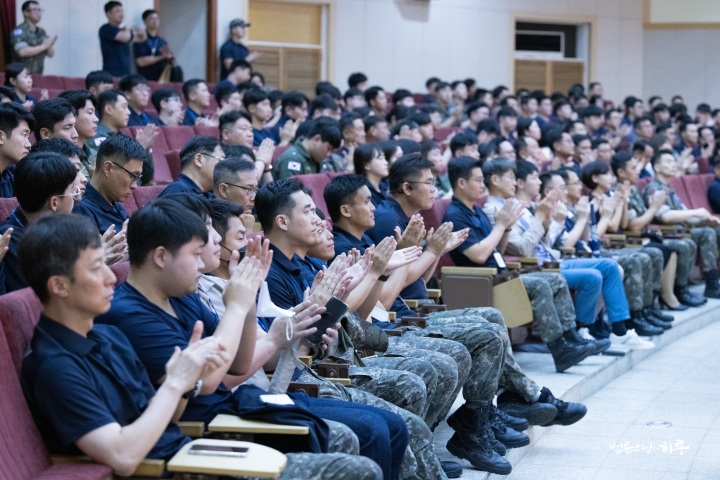
The commander then presented Sunim with a plaque of appreciation.
“Thank you so much for taking time out of your busy schedule.”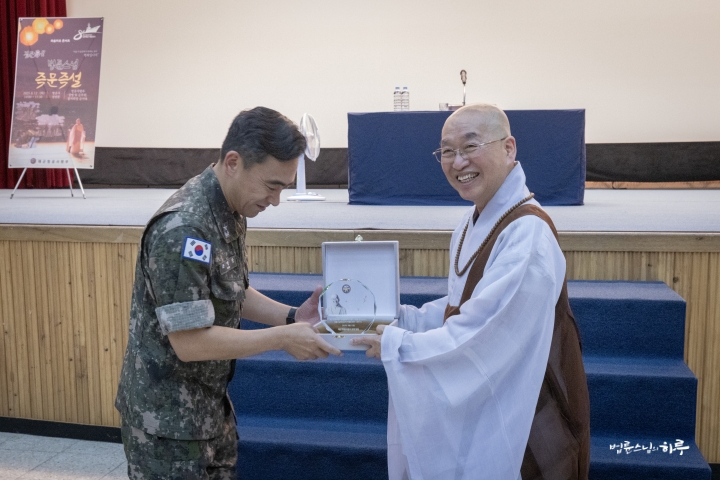
Next, Sunim took a commemorative photo on stage with military officers and their families.
“Naval Air Command, fighting!”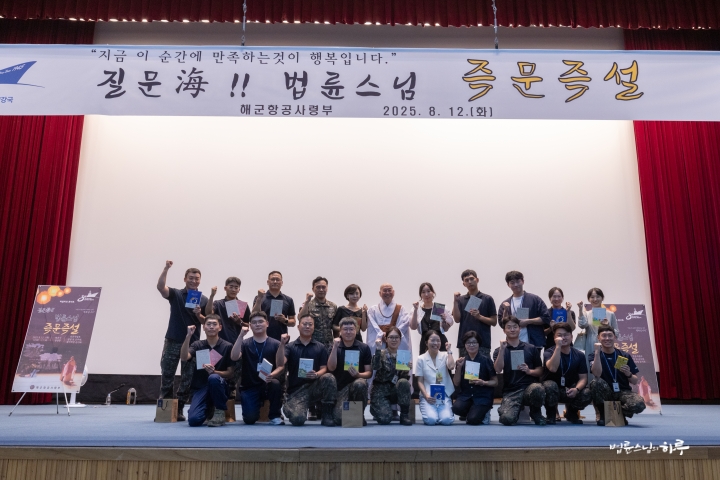
After the photo session, a book signing event immediately followed. The military unit had given Sunim’s books as gifts to the service members who asked questions. The service members lined up to get Sunim’s autograph in their books.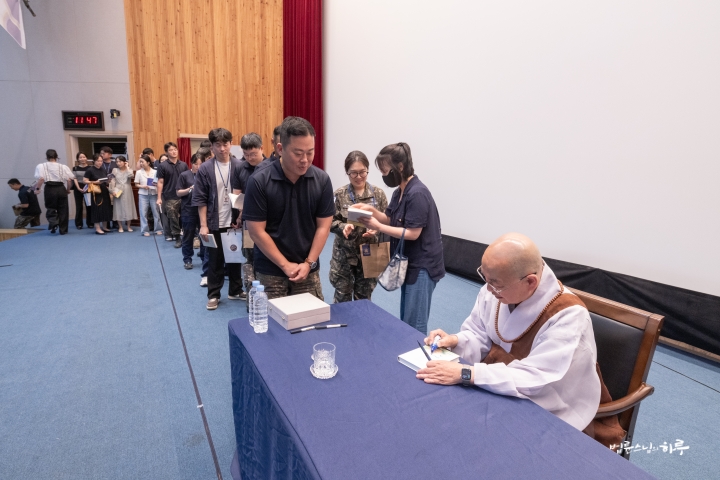
“I really enjoyed today’s lecture.”
“Continue your military service well.” 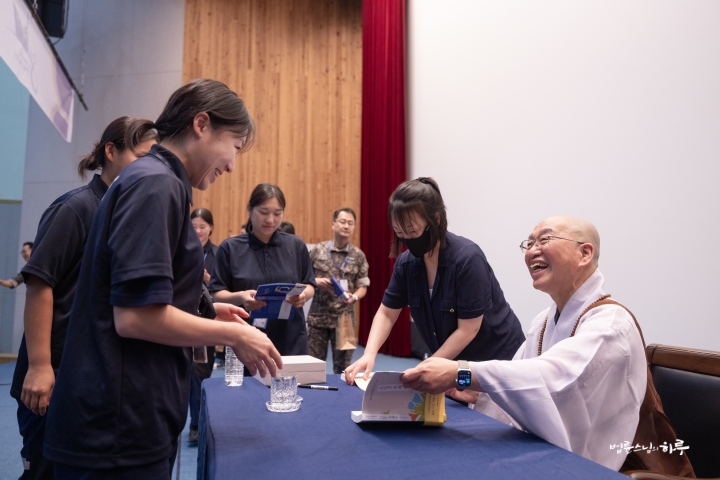
Sunim offered warm words of encouragement with a bright smile to the service members who expressed their gratitude.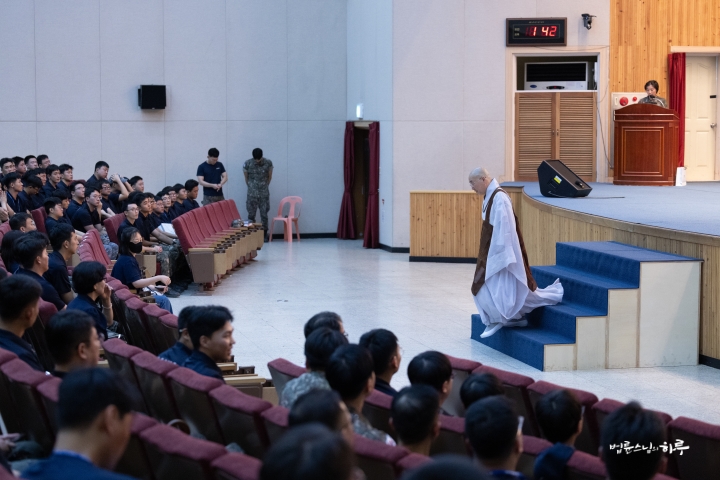
The commander and other military officials saw Sunim off from the lecture hall until he got into the car. A pastor serving as a military chaplain quietly expressed his gratitude to Sunim.
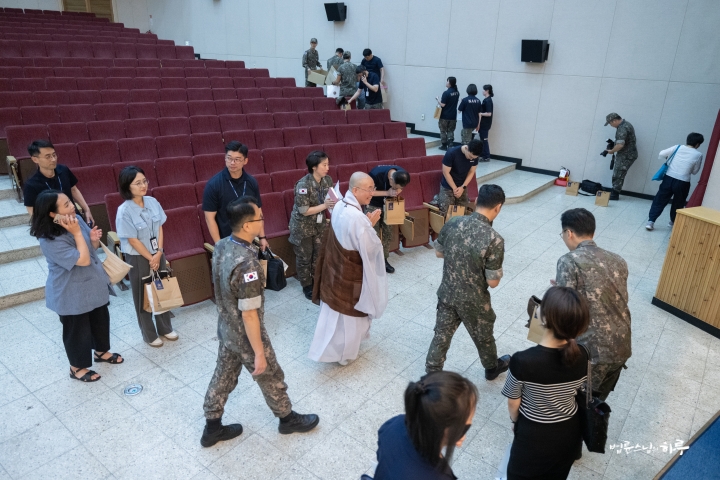
“The words you shared today were truly needed by our service members. We would be very grateful if you could make time for sessions like this more often in the future.”
“I will. See you again next time.”
After shaking hands with the commander, Sunim got into the car. Departing from Pohang at noon, Sunim headed back to Dubuk Jungto Retreat Center.
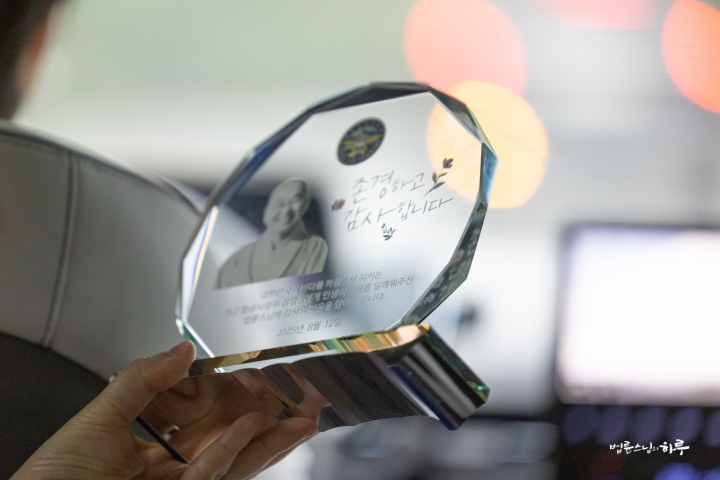
Arriving at Dubuk Jungto Retreat Center at 1 PM, Sunim had lunch. In the afternoon, he traveled to Busan for dental treatment.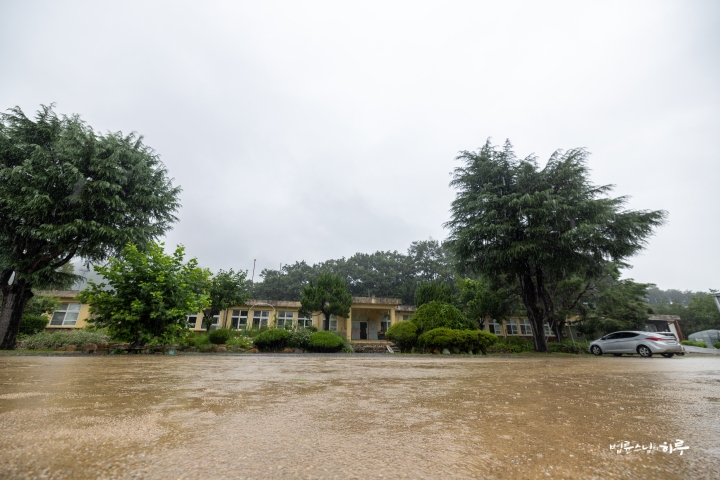

After sunset, Sunim spent the evening indoors proofreading manuscripts and attending to various tasks before concluding the day’s activities.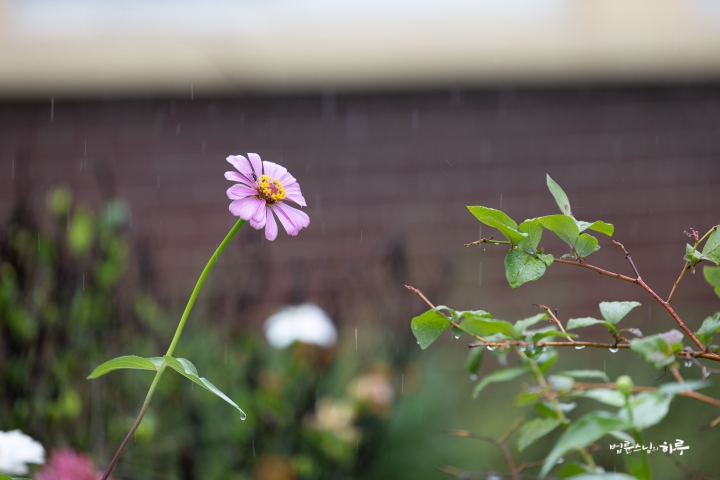
Tomorrow morning, Sunim will trim the overgrown grass on both sides of the village entrance road and conduct a live broadcast of the Weekly Dharma Assembly from the broadcasting room. In the afternoon, he will travel to Seoul to pay respects at the funeral hall of the late Most Venerable Hyogyeong, Honorary Chairman of Daegakhoe. In the evening, he will meet with JTS volunteers to discuss the dispatch of personnel to Bhutan.




